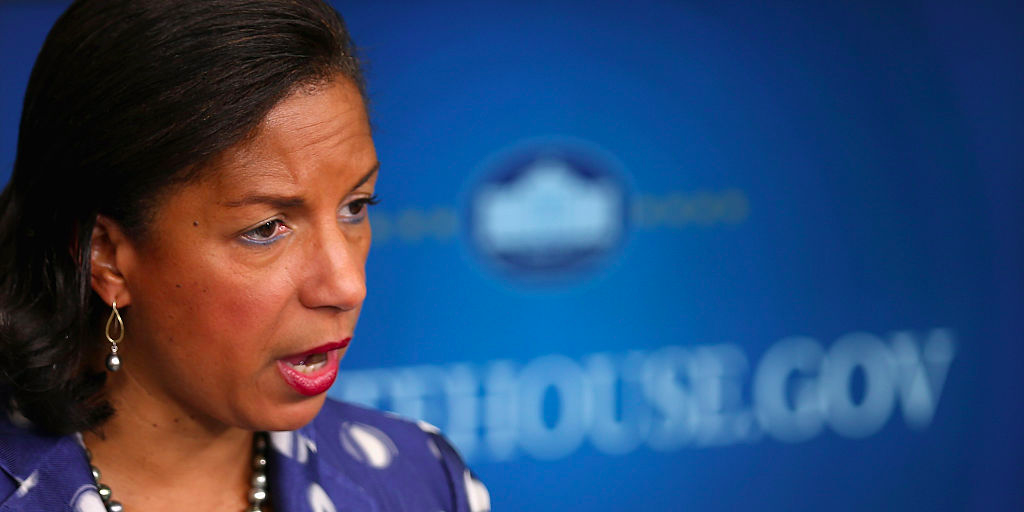- Former President Barack Obama’s cyber response team reportedly wanted to strike back hard at Russia when they first learned of its election meddling in the summer of 2016.
- But as they began floating options on how to respond, then-national security adviser Susan Rice allegedly told them to stand down and “knock it off.”
- A source familiar with the matter did not contest the characterization, but said the Obama administration “timed its response so as to not provoke the Russians into materially affecting the outcome of the election.”
Sign up for the latest Russia investigation updates here.
In the summer of 2016, while the US intelligence community was just beginning to grasp the magnitude of Russia’s attack on the 2016 election, Obama administration officials were torn over how to respond.
According to investigative reporters Michael Isikoff’s and David Corn’s new book, “Russian Roulette: The Inside Story of Putin’s War on America and the Election of Donald Trump,” the White House director of cybersecurity, Michael Daniel, was particularly concerned when he learned in June that Russian actors had infiltrated critical election infrastructure in several US states.
The attacks began occurring so often, an excerpt from the book on Yahoo News said, that a National Security Council staffer began regularly updating Daniel about them.
"Michael, five more states got popped," the staffer once said, according to the book. At one point, Daniel reportedly replied to the staffer, "It's starting to look like every single state has been targeted."
Obama administration officials did not believe the Russians had the technological savvy to manipulate the vote count. Rather, they were more concerned hackers could alter voter rolls, registration files, or other processes that could sow doubt about the legitimacy of the election as a whole.
Bloomberg reported last June that election systems in as many as 39 states could have been attacked, though voting tallies were not believed to have been altered or manipulated in any way.
"In Illinois, investigators found evidence that cyber intruders tried to delete or alter voter data," Bloomberg said. "The hackers accessed software designed to be used by poll workers on Election Day, and in at least one state accessed a campaign finance database."
As evidence of Russian cyberactivity targeting the US election emerged, Daniel and Celeste Wallander, the top Russia analyst on the National Security Council, pushed for the US to strike back at Russia, and hard.
"I wanted to send a signal that we would not tolerate disruptions to our electoral process," Daniel said, according to the book. "The Russians are going to push as hard as they can until we start pushing back."
Daniel and Wallander then laid out a number of aggressive options, including targeting the Russian intelligence community and Russia-linked actors through a string of NSA-backed cyberattacks; leaking classified intelligence revealing the financial activities of Putin and his family members; and announcing a joint US-NATO "cyber exercise" to make clear to Russia that the US and the West was capable of crippling the entire country.
But when then-national security adviser Susan Rice learned of Daniel's plans, she called him into her office and told him to cease his operations.
"Don't get ahead of us," Rice reportedly said, and added that the cyber response team needed to stand down and "knock it off."
When Daniel later went back to his office, the book said, he told his aides, "That was one pissed-off national security adviser."
The staffers on Daniel's cyber response team were baffled when he informed them that they had been told to stand down. When they asked the cybersecurity director why they weren't taking action, Daniel reportedly told them Rice and the homeland security adviser, Lisa Monaco, were concerned that then-President Barack Obama would be "boxed in" if news of their deliberations leaked to the press.
A source familiar with the matter did not contest the characterization, but said the Obama administration "timed its response so as to not provoke the Russians into materially affecting the outcome of the election."
The White House's internal struggle over how to address Russia's election meddling has been well documented. Last year, The Washington Post reported that when they were faced with the question of how best to respond to Russia's meddling, one senior official told the outlet, "I feel like we sort of choked."
Intelligence officials said initially that they could not respond until they had a clearer picture of the scale and scope of Russia's interference. And when it came time to respond, The Post reported, Obama decided to retaliate after the election to avoid appearing as though the White House was putting its thumb on the scale in favor of Hillary Clinton, then the Democratic presidential nominee.

